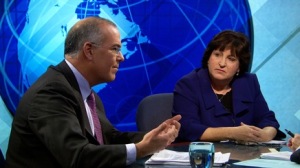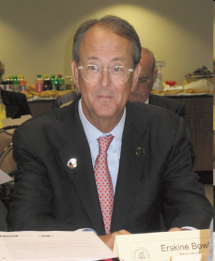Most everyone has heard by now that Simpson and Bowles were able to garner 11 votes for their set of deficit reduction recommendations. They needed 14 votes from the 18 member commission. Members on the “far right” and the “far left” (however those terms are defined) voted no and hence left Simpson and Bowles three votes short.
This is not in any sense of the word good news. Let’s just consider how it was handled on Jim Lehrer’s PBS Newshour conservative-liberal give and take segment (http://www.pbs.org/newshour/). There is a reason that neo-conservative David Brooks and the not very liberal Washington Post columnist Ruth Marcus were absolutely giddy about the 11 votes for the Simpson/Bowles plan. They expressed effusive praise for those commission members willing to “make the hard choices” (such as reduction in Medicare and Social Security) and believe that yesterday’s vote is a harbinger of future action.
Brooks and Marcus could more aptly be said to have had a conservative versus extremely conservative give and take. It was, in their view, a surprise that 11 of the 18 members of the commission would actually support draconian Social Security and Medicare cuts. It was also, in their view, a matter of time until Congress is willing to muster the courage to vote these recommendations into law.
I find it very interesting that this conservative-liberal give and take included nothing about Simpson’s and Bowles’s recommended tax cuts for corporations and the wealthy as well as nothing about their recommended regressive tax increases for low and middle income classes. This is why liberal support for public television puzzles me. I will probably anger some liberals by saying this, but I believe PBS, like NPR, has become a propaganda outlet for the ruling class. Given that their underwriters include Bank of America, EXXON, the Kauffman Foundation, etc., I am not surprised that they don’t really present a progressive side of issues.
I must apologize to those liberals and progressives who don’t like to talk about “war,” and think that terms like “class warfare” are best left unsaid. The fact of the matter is, however, that a class war is being waged on middle and lower income classes right now. It has been going on for some time. Perhaps, it would be a good idea for those who don’t think that we should call it “class war” to reflect on a few phenomena:
- Wages and salaries have been stagnant for some time for all but the very high paid and very rich.
- The cost of college has been outstripping inflation for the past thirty years and is becoming increasingly unaffordable for middle class families.
- Twenty-five percent of the U.S. working-age population is either unemployed or underemployed while corporations and the financial services industry continue to reap record profits and pay obscene salaries and bonuses.
- Young people are graduating from college with an inordinate level of college loan debt and with few prospects for all but the most menial employment.
- Although she went to prison for saying it, Leona Helmsley was telling the truth when she said “We don’t pay the taxes, the little people pay the taxes.”
- In 2009, corporate America spent $3 billion on lobbying the U.S. Congress and was able to lock up control of the U.S. government through a Supreme Court case entitled Citizens United.
The quality of life for the middle class is sinking. Furthermore it will continue to sink and life will become increasingly difficult for everyone and every family below the wealthiest few percent. The first step in fighting back is to recognize the truth; to come to grips with reality; to stop believing media propaganda; and to stop thinking that the Democrats and the Obama Administration will take up our cause unless we, en masse, begin to demand a change.
Call your PBS and NPR local stations and tell them you will not contribute any money to them until they begin to press the national NPR for fair and balanced news and analysis. Demand that we hear the other side. I have had several conversations with Patricia Cahill at KCUR and can tell you that she is a sensitive and open-minded manager and a generally all around good person. She will pass your comments along to the national offices of NPR (she is also on the NPR board of directors).






